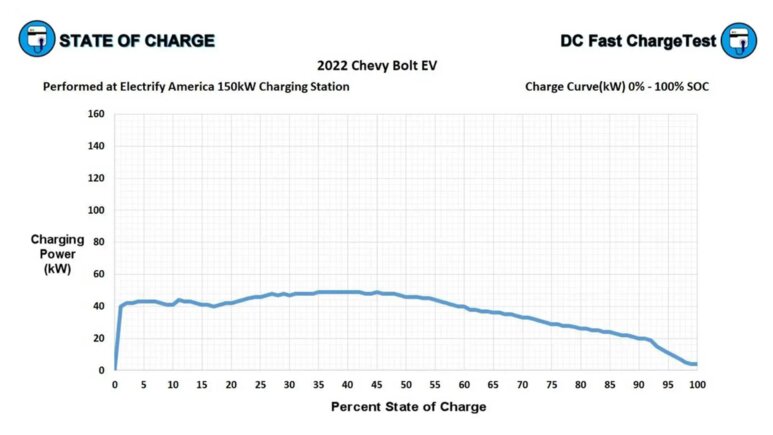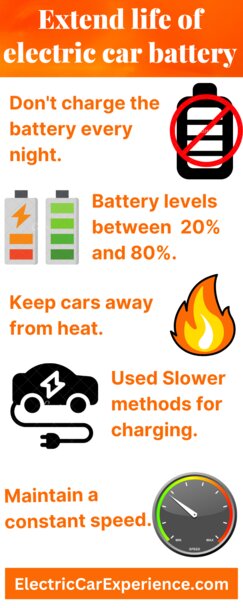
If you’re considering purchasing an electric vehicle (EV), you’ve probably considered a new Chevrolet Bolt. The Chevrolet Bolt EV is an excellent EV option for Richmond drivers, but how long does it take to charge a Chevy Bolt?
In general, there are several charging options, so you can fully charge a Bolt in just 9.5 hours. You can even get up to 90 miles of range in 30 minutes. This electric car charger can recharge up to 160 miles of range in under an hour.
The graph below shows an analysis of DC fast charging and what Bolt EV (and Bolt EUV) owners can expect when they use the technology.

The table below shows the time needed to charge Chevy Bolt EV.
| State of Charge | Time needed | Miles added |
|---|---|---|
| 25% | 25 minutes | 65 |
| 50% | 47 minutes | 130 |
| 75% | 75 minutes | 195 |
| 100% | 133 minutes | 260 |
The table below shows the range of Chevy Bolt according to charger type.
| Charger Type | Range per hour of charge (miles) | 0 to 100% Charge |
|---|---|---|
| Level 1 / 120 V | 4 | 2 – 3 days |
| Level 2 / 240 V | 25 | 9 – 10 hours |
| Level 3 DC Fast Charging | 95 | 30 mins |
You can get 90 to 100 miles of range in 30 minutes by connecting to a DC fast charger.
To protect the battery from premature degradation, the charging rate slows significantly once it reaches 50% and then again at 80%. This makes predicting how long it will take to fully charge to 100% when using a fast charger difficult.
The Chevy Bolt is a small EV hatchback that was released in 2017 and is the best-selling non-Tesla EV in the United States. It’s one of the more affordable all-electric vehicles on the market today, with good performance and a long range.
The Bolt was completely redesigned for 2022, and a slightly larger crossover version, the Bolt EUV, was introduced. If you’re considering purchasing a Bolt as your next vehicle, you may be curious about its durability and average lifespan, and much more details.
In this article, we have covered the complete guide to Chevrolet bolt so Don’t miss out any things.
[toc]
How Long does the Chevy Bolt Last?

The Chevrolet Bolt is expected to last between 300,000 and 400,000 miles before significant battery degradation reduces range and performance.
When properly maintained, charged correctly, and driven conservatively, annual mileage of 15,000 miles equates to 20 – 26 years of service.
Certain factors can have an impact on the life of your electric car battery, causing it to fall short of the average life expectancy. Fortunately, several of these elements are covered by Chevy’s generous warranty.
If you notice anything out of the ordinary, such as a warning light on your dashboard, make an appointment for service right away.
Things That Could Reduce the Life of an Electric Car Battery
- Electrical connections between cells or battery modules are poor.
- Manufacturing flaws in battery cells
- Battery temperatures that are extremely high or low
- Differences in cell manufacturing
- Mechanical battery damage during routine maintenance or service
- Inadequate serving procedures
- Battery cell or battery module imbalances
- abnormally high or low charging rates
The bottom line is that if properly maintained, an electric car’s battery pack should last for well over 100,000 miles before its range is limited. According to Consumer Reports, the average EV battery pack has a lifespan of around 200,000 miles, which equates to nearly 17 years of use if driven 12,000 miles per year. While batteries typically last for years, there are some things you can do to extend their life.
Some Things to Extend the life of Your Electric Car Battery:

- You should not charge the battery every night.
- Keep the battery levels between 20% and 80%.
- Keep the car as far away from extreme heat as possible.
- You should not use DC fast charging for every charge. Slower methods should be used on occasion.
- Maintain a constant speed and do not exceed the speed limit.
The Bolt’s battery has an 8-year/100,000-mile warranty and will be replaced or repaired if it loses 60% of its original capacity during this time.
Is the Chevy Bolt Prone to Rusting?

Yes, many of its body panels, including the doors, hood, and rear hatch, are made of aluminum, which does not rust. Aluminum corrodes, but it does not rot like rusted steel. Thus, The Chevy Bolt does not suffer from widespread corrosion or rust.
The brake rotors on the Bolt rust are rarely used because the car’s regenerative braking is usually sufficient to slow the vehicle down in normal driving situations.
However, brake rotors are relatively simple and inexpensive to replace, and you simply need to remember to use the brakes from time to time to avoid this.
Rust Prevention Tips for Your Chevy Bolt:

- Wash and dry your car.
Regularly, including the underside (especially in the winter) remove the salt, dirt, and grime that causes rust. At the end of each winter, we recommend having a detail shop wash everything underneath.
- Repair any paint damage or scratches:
Exposed metal oxidizes. If the damage is beyond repair, contact your local body shop.
- Garage:
Keep your Chevy Bolt in a garage to keep it safe from the elements and bird droppings.
- Waxing:
Twice a year, wax your car. Not only will this give your Chevy Bolt a nice shine, but it will also protect it from rust.
- Rustproofing:
If you intend to keep your Chevy Bolt for an extended period, you may want to consider rustproofing treatment; popular options include Krown and Rust Check.
- Ceramic Coating:
This is a popular option for those looking to add an extra layer of protection to their paint job.
The Chevy Bolt also includes a 3-year/36,000-mile corrosion warranty as well as a 6-year/100,000-mile corrosion perforation warranty in the event of premature corrosion or rust.
What is a Chevy Bolt’s High Mileage?
A Chevy Bolt with 100,000 miles on the clock is considered to have high mileage.
Although the battery will most likely last many more years, it will have degraded to some extent from being charged and discharged, making it less efficient and not having the same capacity as when it was new.
It is also important to consider the wear and tear on other parts of the vehicle; after 100,000 miles, parts such as the shocks, wheel bearings, brakes, and A/C may require some attention.
However, if the vehicle is in good condition and has been well maintained, you won’t have to worry as much about the electric powertrain giving you headaches as an ICE (Internal Combustion Engine) vehicle would.
Consider the following when purchasing a used Chevy Bolt:
- History of maintenance:
Check to see if the car has been properly serviced and if the owner can provide proof of this, as well as if any recall work has been completed.
- Second Opinion.
Because all-electric vehicles are heavy, inspect the tires and brakes for wear. Also, listen for any unusual noises coming from the suspension.
Obtain a second opinion. Take it to a reputable independent auto repair shop or have it inspected by a mechanic you know and trust.
- Examine the inside.
The interior condition reveals how well the car was maintained and cared for. Does the steering wheel, pedals, or shifter appear to be brand new? If this is the case, there is a good chance that the car was heavily used and those parts were recently replaced before the sale.
- No. Of Previous Owners.
Previous owners’ number Less is more, as a general rule. More owners usually result in more wear and tear. If it was owned by a single family who drove the entire mileage and serviced the car, you can almost guarantee they took good care of it throughout their ownership.
- How long do you intend to keep the car?
If you intend to keep the car for a long time, consider whether the short-term savings outweigh spending a little more on something more reliable.
How Long Will a Chevy Bolt Battery Last?

The Chevy Bolt’s battery should last 300,000 to 400,000 miles before losing capacity and range.
The Chevy Bolt employs lithium-ion batteries, which are similar to those found in laptops and smartphones but are significantly larger, allowing them to not only last longer but also degrade much more slowly.
The batteries in the Bolt use active liquid cooling to prevent overheating in a variety of driving environments and conditions.
Furthermore, the Chevy Bolt employs advanced Battery Management Systems to prevent owners from fully draining and charging their batteries, which accelerates battery degradation.
The Chevy Bolt initially came with a 60 kWh battery, which was increased to 66 kWh in 2020.
When compared to other EVs on the market, its battery size is fairly average, but it is still larger than the batteries found in the standard range versions of the Nissan Leaf and Tesla Model 3.
This means you’ll need fewer charge cycles to travel the same distance, which helps to extend the battery’s lifespan even further.
Laptop and phone batteries typically wear out after 500 to 1,000 charge cycles because they are constantly charged to 100% and drained to near 0% to get the most life out of them.
However, with all of the battery protection built into the Bolt, it should last for at least 1,500 charge cycles and possibly up to 3,000 cycles if the charge/discharge cycles are properly managed.
How to Extend the Life of Your Chevy Bolt
- Adopt calm driving habits.
- To increase range and battery life, use regenerative braking.
- Charging it every couple of days is preferable to charging it every day to keep it charged.
- Maintain your vehicle by the manufacturer’s recommendations.
- Use high-quality components and fluids.
- Keep up with repairs to keep them from becoming bigger issues.
- Wash your Chevy Bolt regularly to remove dirt and grime and protect the paint and prevent rust.
- Keep your Chevy Bolt in a garage to keep it safe from extreme heat.
- Read the owner’s manual to learn where important components are located, what your Chevy Bolt requires and in what quantity, and to comprehend the symbols and dashboard warning lights.
As a whole
The Chevrolet Bolt is one of the best electric vehicles on the market today. Its price is on the lower end of the electric vehicle cost spectrum, and its battery range is comparable to the competition. Charging in this small EV is relatively quick and simple.
The Chevy Bolt is capable of charging at all three EV charging levels, from the slowest Level 1 to the fastest DC charging level, Level 3.
Level 1 – Increases range by approximately 4 miles per hour.
Level 2 – Adds approximately 39 miles of range per hour, or takes 7 hours to fully recharge the battery.
Level 3 – Increases range by approximately 100 miles in 30 minutes.
FAQs
How Often do You need to Charge a Chevy Bolt?
In general, depending on your needs, you can charge it twice or three times per week, but you should not charge your electric car every day. In most cases, it isn’t necessary. The practice of charging an electric vehicle every day can reduce the battery pack’s lifespan.
Is Chevy Bolt EUV Worth Buying?
The Bolt EUV is undoubtedly worth purchasing. It has many of the characteristics you want in an electric utility vehicle: plenty of space, quick acceleration, and a reasonable driving range. The Tesla Model Y and Ford Mustang Mach-E, on the other hand, have even longer ranges.
How Long do Chevy Bolt Tires Last?
The tire lifespan of the Chevy Bolt appears to be heavily influenced by the owner’s driving style. Some Chevy Bolt owners report needing new tires between 20,000 and 30,000 miles, while others report getting more than 50,000 miles out of a set of tires.
How often Should you Replace Your 2022 Chevy Bolt EV Battery?
The Chevy Bolt EV battery typically lasts 3 to 5 years, but this can vary greatly depending on weather conditions, battery type, battery size, and driving habits. Even so, just because your battery isn’t completely dead doesn’t mean it’s in perfect working order.
Posts related to electric cars.
- Top 10 reasons why Solid-State batteries are better than Lithium-Ion batteries in EV-A complete guide 2024
- What Does an Electric Car Battery Look Like?
- Tesla Model X 12V Battery Replacement-Complete Guide 2024
- Can A Damaged Piece of Electric Car Battery be Repaired?
- What happens to old electric car batteries? can they be recycled?
- Can Electric Car Batteries Explode?
- Does a Lithium-Ion Battery Make Electric Car Expensive?
- Chevy Bolt Battery Health After 1 Year After 2 Years After 5 Years
- Top 9 Ways To Reduce Charging Time For Electric Car
- Tesla Beeping Sound While Parked – (Tesla Model 3, Model X, Model Y, Model S)
- Chevy Bolt Battery Degradation
- What Percentage Should I Charge A Tesla Battery?
